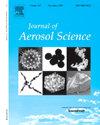Carrier gas-driven compositional variations of platinum-tungsten nanoparticles generated by spark ablation
IF 3.9
3区 环境科学与生态学
Q2 ENGINEERING, CHEMICAL
引用次数: 0
Abstract
Bimetallic nanoparticles are of interest in various catalytic applications as cost-effective replacements for precious metal catalysts. Ongoing research is aimed at developing new techniques to produce nanoparticles with precise control of their composition, size, and structure. In this study, we investigated the tuning of the composition of platinum–tungsten bimetallic nanoparticles by spark ablation. Using pure electrodes, the spark ablation method offers the possibility of forming mixed nanoparticles and adjusting their size and composition by modifying the carrier gas mixture. Morphological, structural, and compositional characterizations by High-Angle Annular Dark-Field (HAADF) and Bright Field (BF) imaging in Scanning Transmission Electron Microscopy (STEM) and Energy Dispersive X-ray (EDX) microanalysis were used to evaluate the nanoparticle size distribution and the ratio of Pt to W, whereas interlayer d-spacings were quantified using the Selected Area Electron Diffraction (SAED) technique. Similar to previous studies that have demonstrated homogeneous internal nanoparticle mixing with different electrodes, we observed that the nanoparticles generated from the monometallic electrodes were mixed mostly homogeneously. Additionally, we demonstrate that the use of platinum as the initial anode and tungsten as the initial cathode in a nitrogen atmosphere can promote the formation of core-shell nanostructures. A theoretical model of electrode ablation was developed using the current and voltage discharge profiles to estimate the composition of the synthesized nanoparticles. The modeling revealed a longer period between platinum electrode evaporation and tungsten electrode evaporation during spark discharges as a potential reason for core-shell formation.

载气驱动火花烧蚀制备的铂钨纳米颗粒的成分变化
双金属纳米颗粒作为贵金属催化剂的低成本替代品,在各种催化应用中引起了人们的兴趣。正在进行的研究旨在开发新技术,以生产精确控制其组成、大小和结构的纳米颗粒。在这项研究中,我们研究了火花烧蚀对铂钨双金属纳米颗粒组成的调谐。使用纯电极,火花烧蚀方法提供了形成混合纳米粒子的可能性,并通过改变载气混合物来调整其大小和组成。利用扫描透射电子显微镜(STEM)的高角度环形暗场(HAADF)和亮场(BF)成像和能量色散x射线(EDX)显微分析对纳米颗粒的尺寸分布和Pt与W的比例进行了形态学、结构和成分表征,而层间的d间距则使用选择区域电子衍射(SAED)技术进行了量化。与之前的研究类似,我们观察到单金属电极产生的纳米颗粒混合均匀。此外,我们证明了在氮气气氛中使用铂作为初始阳极和钨作为初始阴极可以促进核壳纳米结构的形成。建立了电极烧蚀的理论模型,利用电流和电压放电谱来估计合成的纳米颗粒的组成。该模型揭示了火花放电过程中铂电极蒸发和钨电极蒸发之间的较长时间是核壳形成的潜在原因。
本文章由计算机程序翻译,如有差异,请以英文原文为准。
求助全文
约1分钟内获得全文
求助全文
来源期刊

Journal of Aerosol Science
环境科学-工程:化工
CiteScore
8.80
自引率
8.90%
发文量
127
审稿时长
35 days
期刊介绍:
Founded in 1970, the Journal of Aerosol Science considers itself the prime vehicle for the publication of original work as well as reviews related to fundamental and applied aerosol research, as well as aerosol instrumentation. Its content is directed at scientists working in engineering disciplines, as well as physics, chemistry, and environmental sciences.
The editors welcome submissions of papers describing recent experimental, numerical, and theoretical research related to the following topics:
1. Fundamental Aerosol Science.
2. Applied Aerosol Science.
3. Instrumentation & Measurement Methods.
 求助内容:
求助内容: 应助结果提醒方式:
应助结果提醒方式:


